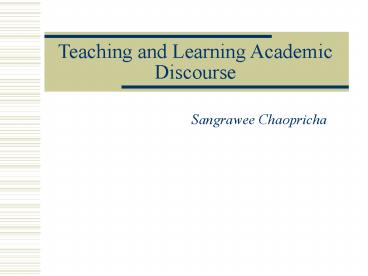Teaching and Learning Academic Discourse - PowerPoint PPT Presentation
Title:
Teaching and Learning Academic Discourse
Description:
Teaching and Learning Academic Discourse Sangrawee Chaopricha Philosophy L. Vygotsky s Learning Theory M. Bahktin s Discourse Community M. Nystrand s ... – PowerPoint PPT presentation
Number of Views:122
Avg rating:3.0/5.0
Title: Teaching and Learning Academic Discourse
1
Teaching and Learning Academic Discourse
- Sangrawee Chaopricha
2
Philosophy
- L. Vygotskys Learning Theory
- M. Bahktins Discourse Community
- M. Nystrands Construction of Knowledge
3
L. Vygotskys Learning Theory
- Social and cultural aspects
- Zone of proximal Development
- Situated Learning and Scaffolding
- Language and dialogues
- Spontaneous and Scientific Concepts
4
M. Bahktins Discourse Community
- Discourse community
- Academic Discourse
- Stratification with multivoicedness
- Interactions are intertextual
5
Academic Discourse
- Socio-dialectological principle.
- Socially and culturally contingent, dynamic
- Specific conceptualization and intentional
dimensions. - Linguistic components and situation.
6
Genre Knowledge
- Everyday genre
- Secondary genre
7
Generic Stratification
- Everyday Genre
- Genre is a horizon of expectations brought to
bear on a certain class of text types. It
includes features of language (linguistic and
rhetorical conventions) that knit together with
specific points of view, approaches, forms of
thinking, nuances and accents characteristic of
the given genre, e.g.,oratorical, publicistic,
jounalistic genres.
8
Professional Stratification
- Secondary genre
- The language of the lawyer, the doctor, the
public education teacher, etc. - These sometimes coincide with and sometimes
depart from the stratification into genres. - They involve different terms, specific forms for
manifesting intentions, forms for making
conceptualization and evaluation concrete.
9
Dialogue
- It is a verbal process between two different
people or between an earlier and a later self. - Intertextuality
- The word is half someone elses.
10
Nystrands the Construction of Knowledge
- The Theory of Reciprocity
- The Contruction of knowledge is cognitive,
contructive and communicative processes. - Readers read on the premise of writers and
writers write on the premise of readers. - Semantic potentialities
11
The Theory of Reciprocity
- The theory of reciprocity governs how people
share and exchange knowledge when they
communicate, and how they choose to present it in
discourse. - The fundamental motive for discourse production
is assuring reciprocity between writer and
reader/ speaker and listener.
12
Reciprocity
- Elaboration (abbreviation and deletion) is(are) a
communicative option(s) and strategy(ies) to
maintain the terms of reciprocity. - When elaboration, abbreviation or deletion at the
levels of genre, topic, and comment is
sufficient, writers leave readers with no
uncertainty about the meaning of the
communication.
13
Pedagogy
- Academic discourse should be taught through
apprenticeship format, dialogue and a socially
situated problem solving process - Teachers need to first analyze, identify, and
explicitly teach students the academic
conventions and ways of thinking process required
in different discourse communities.
14
Pedagogical Strategies
- Initiation-modeling, exploring, negotiating,
meaning making, reading-to-write - Enculturation- creating social milieu/tasks
Dialogicality-collaborating, interacting, problem
solving - Expert-novice- scaffolding, coaching,
15
Pedagogical Strategies
- Tasks-require students construction of meaning
and knowledge. - Empowerment- constructing a new representation of
ideas and issues that makes new sense,
positioning their work with authority within it,
fading
16
Research Methods
- Conference Protocols
- Stimulated Recall Interviews
- Discourse Analysis
17
Further Studies
- Demystification of certain concepts
- Practices of certain pedagogical strategies in a
classroom setting.
18
Teaching and Learning Academic Discourse
- Teaching and learning academic discourse is a
process of active cognitive reorganization and a
process of enculturation into an academic
community.






























